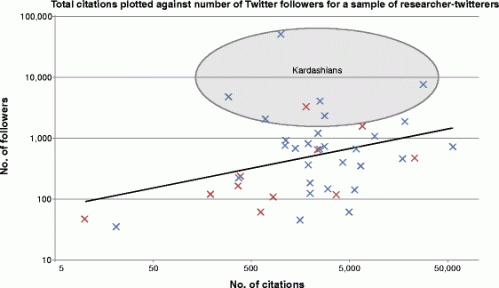Judith Curry is a professor and Chair of the School of Earth and Atmospheric Sciences at the Georgia Institute of Technology. Although she once shared many of the scientific opinions of the hockey stick, apocalyptic, save the polar bears, crowd Curry followed the facts into the skeptical persuasion. She is troubled by what she calls the "tribal nature" of parts of the climate-science community and the perpetual stonewalling of the release of data that does not conform to the preconceived ideas of that community.
Today on her blog, Climate Etc, in half serious, half whimsical prose Curry examines the Kardashian Index in a must read post. The K Index was published at Genome Biology and determines one's social media presence. The creator, Neil Hall, worries that many scientist achieve professional renown not through the traditional course of publishing serious academic papers but rather through the Twitter sphere meaning that speaking loudly is more important than speaking correctly. Hall created the K Index to allow serious scientists to check their media presence. If one should have a K-index greater than 5 one should quit tweeting and start publishing serious work.
"Hence a high K-index is a warning to the community that researcher X may have built their public profile on shaky foundations, while a very low K-index suggests that a scientist is being undervalued. Here, I propose that those people whose K-index is greater than 5 can be considered ‘Science Kardashians’."
The Abstract
In the era of social media there are now many different ways that a scientist can build their public profile; the publication of high-quality scientific papers being just one. While social media is a valuable tool for outreach and the sharing of ideas, there is a danger that this form of communication is gaining too high a value and that we are losing sight of key metrics of scientific value, such as citation indices. To help quantify this, I propose the ‘Kardashian Index’, a measure of discrepancy between a scientist’s social media profile and publication record based on the direct comparison of numbers of citations and Twitter followers. Writing further Hall states;
Now consider Kim Kardashian; she comes from a privileged background and, despite having not achieved anything consequential in science, politics or the arts (although apparently she does have a scientific mind, she is one of the most followed people on twitter and among the most searched-for person on Google. Her notoriety is said to have stemmed from an inadvertent internet release of a video featuring her and a boyfriend in a private moment. While her Wikipedia entry describes her as a successful businesswoman, this is due most likely to her fame generating considerable income through brand endorsements. So you could say that her celebrity buys success, which buys greater celebrity. Her fame has meant that comments by Kardashian on issues such as Syria have been widely reported in the press. Sadly, her interjection on the crisis has not yet led to a let-up in the violence.

While we would all agree that Al Gore became the ultimate Science Kardashian before the inception of Twitter Curry detects support for Kardashian method both in the New York Times and in academia. Whether one learned nuclear physics from Jane Fonda or nutritional science from Michelle Obama should make no difference as we fight the holy war to democratize science.


No comments:
Post a Comment